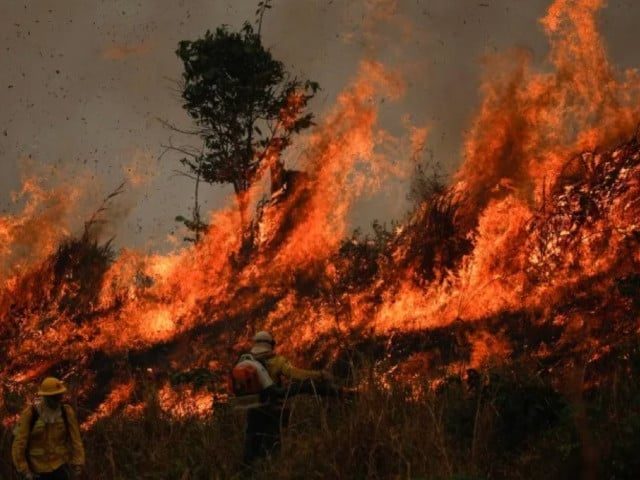The drought’s impact extends beyond the fires, threatening the survival of endangered species and causing irreversible damage to vital forest ecosystems

SUO PAULO: The Brazilian government has launched a significant firefighting operation, deploying nearly 1,500 firefighters to tackle severe fires ravaging the Amazon rainforest, which have been intensified by the worst drought the region has seen in decades. Despite efforts to curb deforestation since President Luiz Inácio Lula da Silva took office in January 2023, the fires have surged, with satellite data recording 59,000 fires this year—the highest number since 2008.
The fires have had a devastating impact on Porto Velho, the capital of the Rondônia state, blanketing its 540,000 residents in thick smoke. The “flying rivers” of moisture that typically flow above the rainforest have been displaced by smoke, leading to a significant reduction in air quality and visibility. The situation is further exacerbated by fires in the Pantanal wetlands, which have been severely worsened by human-caused climate change.
Brazil’s Environment Minister Marina Silva has identified global warming and the El Niño weather phenomenon as primary drivers of the extreme conditions fueling these fires. The ongoing drought has led to record-low levels in the region’s rivers, further compounding the ecological crisis. The drought’s impact extends beyond the fires, threatening the survival of endangered species and causing irreversible damage to vital forest ecosystems.
In response to the escalating crisis, authorities have mobilized 1,489 firefighters and imposed fire bans in the most affected states. The drought and resulting fires are not only a significant threat to local communities and wildlife but also pose a broader threat to the Amazon’s role as a critical carbon sink in the global fight against climate change.
Recent scientific studies have raised alarm over the Amazon’s declining resilience, with concerns growing that the rainforest may be approaching a tipping point where its ability to recover from such environmental shocks is irreversibly compromised. The fires, combined with the prolonged drought, are pushing the Amazon closer to this critical threshold, with potentially catastrophic consequences for the planet’s climate stability.
As Brazil grapples with this environmental emergency, the need for coordinated international efforts to combat climate change and protect the Amazon has never been more urgent. The global community is watching closely as Brazil navigates this crisis, with hopes that swift action can mitigate further damage to one of the world’s most vital ecosystems.
- #AmazonFires,
- #BrazilEnvironmentalCrisis,
- #AmazonRainforest,
- #ClimateEmergency,
- #DroughtImpact,
- #ForestFires,
- #WildlifeThreat,
- #GlobalWarming,
- #AmazonCrisis,
- #EnvironmentalProtection,



